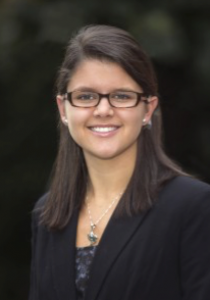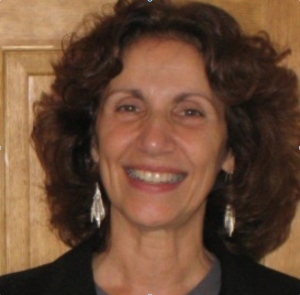 Alison Marinelli, Class of 2018 (AuD/PhD)
Alison Marinelli, Class of 2018 (AuD/PhD)
The University of Connecticut
Ideally, patients form bonds with their audiologists because of the unique role in caring for them and their devices. Repeated positive interactions allow for greater relationships to develop. As a patient, I’ve had the pleasure of working with several talented audiologists over the years and have had a variety of experiences. Now that I’m in graduate school for audiology, I can’t help but use the academic material that I’m learning to take an analytical eye to my own audiologic experiences and evaluate them more thoroughly. A particular experience that was critical to my young life was the tragic death of my beloved audiologist, Dr. Toni Maxon.
Bonding ….
Toni was one of the first audiologists that my parents consulted after my diagnosis of hearing loss at nine months. My parents were seeking all possible avenues to treat my hearing loss, and were exploring the auditory verbal path when they visited her at the University of Connecticut Speech Language and Clinic. I don’t remember these early days, but it was always obvious to me that Toni’s empathetic counseling assisted my parents with the coping process associated with the diagnosis.

Dr. Toni Maxon
My father affectionately recalls the time when my parents were discussing amplification options and I was eating crackers, babbling to my parents about the toys I was playing with nearby. Toni gently pointed out to my parents how desperately I was attempting to communicate, and that the limited language I was producing was due to the limited inputs I was receiving. The kind manner with which she delivered the information touched my parents and started a very close working relationship that carried on throughout all future treatment. When Toni left the UCONN clinic to start the New England Center for Hearing (NECHEAR) with Dr. Diane Brackett, I continued services with her there. My parents and I looked forward to appointments and we continued our sessions with respect for her knowledge and appreciation of her superior services. As she had the ability to impart life experience, give advice, inquire and be truly interested in our family as time marched on, we valued her more and more.
….And Then Loss
This congenial relationship changed in 2007 when my family received a phone call that informed us that Toni had been in a car accident that claimed her life. As anyone who experiences an unexpected event like this would be, we were devastated. A memorial to celebrate her life was organized, and I was asked to speak. I spent countless hours editing and revising my speech, but the words never seemed to accurately represent what Toni meant to me. I remember delivering my speech at her memorial, and choking up at the fact that I had to say goodbye. NECHEAR had also planted a memorial garden, and to dedicate it, they held a celebration of Toni’s life. Both of these special events helped to ease the pain of loss. In the aftermath following her death, qualified clinicians were brought in to program my cochlear implants. The co-founder of NECHEAR, Diane Brackett, also a long-time clinician of mine, sat in on the initial mappings and conveyed important audiological information to the new clinicians on my case. Since I had known Diane previously, she bridged the gap between the old and the new.
This experience of mine was an unfortunate but admittedly unusual situation. Too often in audiology, the importance of client-practitioner interactions is not discussed. I feel strongly that my regular interactions with Toni helped our relationship to grow to where my family and I valued and sought out her opinion. She was instrumental in my decision to get my second implant, and provided insight on how having another device might assist in noisy environments – a situation that produced great anxiety for me. This relationship was “the vehicle for putting into action a paradigm of health that integrates caring, healing, and community. These relationships form the context within which people are helped to maintain their functioning and grow in the face of changes within themselves and their environments” (Tresolini, 2000, p. 24). Because Toni understood the complexities of life with hearing loss, she was able to effectively guide and assist me as a patient, and I grew into a confident teenager who happened to have a hearing loss. Her death was devastating, because I lost the framework with which to navigate the hearing world with. Luckily, I was fortunate enough to have the support and guidance throughout the sudden termination to help me re-establish my hearing health network.
Perhaps even less discussed in the field of audiology is the termination of a patient-client relationship. It is true that our patients rely on the regular maintenance of amplification and assistive devices to continue functioning in a world of communication, and deserve proper handling of the client-clinician relationship. However, Becher et al. (2012) point out that “Examination of therapist mortality on clients is lacking in the clinical literature” (p. 313), and although they were referring to the field of clinical psychology, the point it makes is relevant to audiology as well. Furthermore, termination of client-patient interaction is not limited to death of a therapist. Any number of events can cause interruption in services – whether it is death, pregnancy, or relocation across the country. Psychologists use the terms forced terminations and unplanned terminations to categorize the type of ends to a working relationship. “Unplanned termination occurs when the therapist suddenly ends treatment, often due to accident or death… Forced terminations are often initiated by the therapist based on temporal needs – a move, job change, and retirement – and sometimes it occurs because of illness” (Beder, 2003, p. 26). Whether forced or unplanned, sudden termination often triggers emotional responses on the patient’s part.
Reactions to Loss
Garcia-Lawson et al. (2000) found that “participants who experienced a forced termination were found to have experienced more intense anger and hostility, despair, depersonalization and somatization than those who underwent a planned termination” (p. 95). This information needs to be presented with the caveat that the patients in the experiment were deeply invested in psychiatric relationships, and the audiologic population is slightly different. Nevertheless, it illustrates the wide range of emotions that may be present in a reaction to a sudden termination. Kubler-Ross’s seminal work on grief outlines a cycle of emotions (denial, anger, bargaining, depression and acceptance) that individuals can experience after a life-altering event occurs. Luterman (2008) discusses grief in his classic text, Counseling Persons with Communication Disorders and Their Families. He critiques the Kubler-Ross stages, saying, “I am always leery of any ‘stages’ concept in the grief process. I think the process is basically amorphous, having fluid boundaries and being cyclical in nature rather than being a straight-line progression, as implied by many models of the process” (p. 53). The process of grief in losing a clinician is absolutely not a linear process, and may continue on for months or years after the event. Inheriting clinicians (those who work with the patient after the loss of the previous clinician) must to be sensitive to the process of grief the patient may still be experiencing.
As for myself, I will always miss Toni. However, I have new audiologists who have more than adequately stepped in to help me along the hearing journey. This experience has revealed to me the inadequacy both patients and clinicians feel in handling complicated patient-clinician dynamics. The use of psychological evidence helps, but there are certainly many factors to this unique situation that could benefit from the investigation of audiologists.
References
Luterman, D. (2008). Counseling persons with communication disorders and their families (5th ed.). Austin, TX: Pro-Ed.
